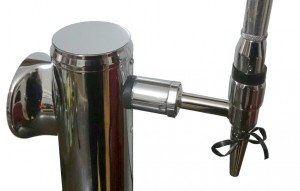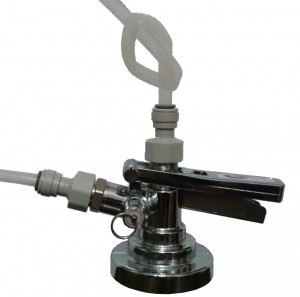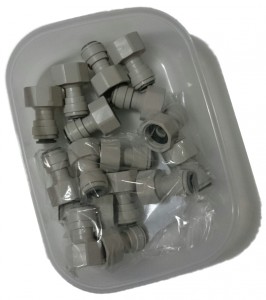
Tied tap
An impromptu #BeeryLongRead inspired by a little Twitter exchange earlier today. It’s a bit of quickly typed up “brain dump” really… little time for finesse with such things these days. I’m very keen to hear any other views on these things. Always learning, ever adapting…
I’ve spent the last year selling good beer to pubs & other drinks sellers – good beer in any format: cask, keg, bottle, can… cask is by far the larger volume market for me. There is a strong “freehouse” scene in the UK, with pubs that like their variety of beer on the cask pumps. And a strong drinker following for enjoying the variety they supply. (Yes, this is a minority of the overall drinking market, but a significant one.)
So – why, when you walk into these amazing freehouses, do you find on the keg taps alongside the cask a very predictable list of ubiquitous multinational-brewed products: Stella, Fosters, Guinness, Carling… here I offer my observations on this. Take note that a) I’m a newbie in the industry and b) I’m in the industry – and fight my own corner.
Anyway, why the lack of variety? Simple: nearly all keg lines in the UK are tied – including those in “free”houses. It’s an interesting situation really… the UK keg beer market is very much like that in New Zealand described here. [I don’t have a survey or stats to quantify any of this – it is merely observation from a year of working with pubs. I’d be very interested in any real data, or just other views on the topic.]
OK – but there’s plenty of complexity under the hood! The basic principle is this:
Beer company (Heineken say) says to pub: we’ll put all the equipment you need to serve these beers into your pub, we’ll look after it for you, you just have to buy the beer from us.
An attractive offer! Single simple delivery of all your keg products, and a whole load of stuff you just don’t have to worry about. The pricing for the “premium” keg brands is also fairly reasonable, and pubs can make a slightly higher GP on them (for the often higher-volume product). So it also subsidises those pesky cask drinkers who go apecrap if their pint costs 10p more than they think it should. (Spirits are actually better still, I’ve been told by many a pub they’d not be in business were it not for cheap vodka & whisky.)

Tied beer line…
Until recently there was very little cause to want to do anything else with keg. There simply weren’t diverse keg beer options on the market – you want ultra-premium, you’ve got -say- Hoegaarden and Leffe… so against the rise of cask ale the big brewers and distributors got themselves very solidly embedded into the freehouse market. And it was pretty much good for everyone. (Yes, there were always a few outliers – bars with knowledgeable enthusiast landlords who get hold of special imports and carved their own niche.)
But now things are changing. Small brewers are toying with keg, led perhaps by BrewDog’s bold positioning of switching over to being keg-only. Keg has various technical advantages – which can be discussed another time – and some folk simply prefer the beer the “keg way”. Usually folk inspired by European and American brewing. BrewDog were far from the first of course – Meantime, Camden, Freedom, and others were forging themselves little keg empires of their own already – with a big focus on supplanting mainstream premium lagers.
Speaking of these lager brewers – they had the strategy that was necessary to crack into this keg market. You’re a small brewer wanting to get your beer into keg, problem: how to you get that keg into a bar? All your locals have equipment owned by BigBrewCo and none of the publicans have the 1st clue about handling kegs beyond absolute basics. Put beer in keg… easy… but what next?
Those who successfully got their kegs into bars knew exactly what: put keg lines into pubs, follow the same model that the pub already understands. We start to see Meantime, Camden, Freedom, etc branded fonts showing up everywhere (in London and the South East at any rate). But this just means more tied lines! There’s a bit more diversity than before, but it’s still mostly “just lager”. The established-keg-breweries themselves provide a little diversity – pale ales, red ales, stouts… but all the same brands and little real “fun” to the beer. “Gateway beers”? Cask is still very much supreme for a tasty pint.
BrewDog’s little keg revolution changes this though – loads of little breweries now put their exciting beers into keg. But there’s a problem: the number of pubs with free of tie keg lines and clued up landlords is relatively minuscule. So now you’ve got dozens (hundreds?) of little breweries all vying for a tiny volume of keg throughput. Mostly relying on a small number of “craft” bars to get beer in front of consumers.
“Craft bars”? To me what it takes to make a pub or bar actually “craft” in ethos is total freedom and no compromise. We see places like the Euston Tap showing up – they know what they want, they don’t want to be tied up, they invest in their own equipment. Ostensibly they’re successful, others follow suite… we’ve now got a small raft of craft venues supporting these breweries. Cambridge 5 years ago probably had zero free-of-tie keg lines, now across 4 venues there are over 30 – and more to come no doubt. But that’s four venues in a city of dozens of cask freehouses. There’s a long way to go.

Simple plastic fittings…
So what needs to happen to keep on growing this free-of-tie “craft” keg beer market? Pubs need to invest… in both equipment and know-how. Both are seriously lacking. I keep coming across pubs that have had free-of-tie keg equipment installed. But with only half the couplers they need, they don’t even know how to change a coupler on the lines, they don’t even have pressure gauges on their gas. They’re heading in the right direction but they need a lot of hand-holding in the short term. That’s what we have to offer – myself as a distributor, breweries to their direct clients. I fully support all keg beer I sell because this is necessary. I drove 80 miles to replace a simple plastic fitting last week – that’s how dire the state of knowledge in the industry is. The tied-keg-line status quo has done a good job of keeping landlords clueless and dependent.
Which raises that point too: the vast majority of publicans really don’t have a clue. After decades of fully supported keg lines the entire keg system is a black box to them. We need to help them skill-up, and really could do with a useful manual of keg system operation. I’ve done my BIIAB ABCQ – and it’s utterly basic, it teaches a reliance on Big Beer – which is of course relevant & correct for most of the current industry. We need something a bit more technical… I believe Cloudwater may be working on something in that direction. For the most part maintenance and operation of keg systems is actually pretty simple stuff, once you’ve got on top of some basic principles.
What’s next? Publicans need to be convinced that it is worth investing in the equipment. Because if I own the equipment in a pub I’ll pretty obviously want only beer I sell going through it – this is just sensible, there’s a cost to be recovered. What I want to do is support pubs in taking ownership of their own equipment, help with installs if needed, and then as part of the service of selling them beer offer full technical support – folk like me and all breweries selling kegged beer need to do the same to make it a viable option for pubs.
We need to get smart and start doing this now. Because the alternative future will be keg lines under the control of medium sized operators. Another recent conversation on Twitter I had was about Adnams. They’re aggressively going after the craft-curious market, sticking their kit in, and creating a craft-monoculture of Adnams/Camden beer across these eastern parts. Now I like Adnams and quite enjoy their Dry Hopped Lager. But this particular practice is pretty damn close to “craftwashing”. We’re getting a growing mid-tier of pseudo-craft-bars with an unchanging range, including craft beers like Bitburger… yes, I really have seen this billed as “craft” in several bars. (Camden and Adnams both deserve a place in a craft lineup… but unchanging lines of either and nowt else isn’t where it should be at.)
From both a personal and a business perspective it is very disheartening to have a good conversation with a pub about getting free of tie keg up and running for them, then to find a fortnight later that rather than that they’ve got the same two beers from Adnams as everyone else. The offer that the likes of Adnams has for these folk is simply too good… the price of stuff like Dry Hopped Lager is good too, as you’d hope. Adnams aren’t “the enemy” per se, they’re very nicely building their own market and if an Adnams tap is replacing a Fosters tap this is a step up. But… y’know… ho hum.
I’ve considered going the whole-hog myself, simply paying to put lines in, tied to myself. But it is so against my own world-view that I’m hesitant… but it is tempting.
There’s a long way to go on this. I’ve done my first full keg install for someone this year, and hope to do more – targeting the micropub sector a bit. I’ve spent a lot of the last 6 months helping folk understand keg, obtain couplers, and handle outlier support cases like “venting” various forms of keg. (Making up for brewery screw-ups, which comes and in hand with the micro/craft sector unfortunately.) It certainly isn’t trivial.
If we all support pubs in this way between us we can build the free-of-tie keg market. Giving publicans and drinkers more options – which is what it is all about in my opinion. It’s what I’m here for anyway.
Sadly necessary disclaimers, because everyone always seems to think that anything I say is all-or-nothing or black-and-white:
- I am NOT saying that all bars and pubs need to be “craft beer” bars/pubs. This is very very far from what I believe.
- I do NOT think that Fosters/Stella/etc need to be eradicated from the face of the Earth. Folk like drinking these beers, they’re the largest part of the beer industry, they’re not going anywhere and they have their place.
- I LIKE ADNAMS – my favourite regional brewer by far, and by securing lines in pubs what they’re doing is simply good business and an attractive deal for publicans. If I were them I’d do the same, and they’re actually a bit “loose” with their tie – to my benefit!
- I don’t claim that keg is superior to cask, I’d not claim the reverse either – they’re different and I believe both have their place.
- I simply want more diversity in a small number of pubs and bars, and I see their lack of access to free of tie lines as an obstacle to my desired level of diversity. (And yes, I have a business interest in this obviously.)
- Another topic: microbrewery keg pricing… a sticky issue and a definite barrier for publicans.
- And the simple fact is that fancy keg beers are a harder sell for the publican. It takes a bit more work than shifting a pint of Stella. It’s definitely not for everyone… yet look to the “craft beer bars” and observe their apparent success. Why not give it a try?
Good one.
The obvious thing is for distributors to start doing the same as the big beer companies (as you did say).
What happens in tied pubs? Is there any potential for say SIBA to have keg lines?
Interesting question about SIBA. They have contracts with some pubcos on the cask side of things, SIBA DDS. A saving grace for many a tied pub. Maybe they could do the same for keg in the future. SIBA brewers do have some discounted access to cellar services companies already I think.
Pingback: All the #BeeryLongreads from February 2015
Good post.I didn’t know the keg lines were tied but have noticed in London that loads of pubs seem to have Meantime/Adnams /Camden keg lines.I just assumed that they had little knowledge of what is good and have jumped o the bandwagon of Craft.
Good post!
The Adnams keg line thing normally seems like a net win from my point of view, though. This is still a country where a large proportion of real ale drinkers get annoyed if their local changes the guest ale after a fortnight, just when they were getting used to it (cf The Cask Report last year), so a lot of pubs are going to have to tend to a certain conservatism, and those tend to be the sort of pubs where I come across Adnams keg stuff. So for me it almost always seems like a big step up from Stella and Carlsberg rather than a big step down from an ever changing range of diverse and exciting stuff…
(I guess you can also see it as another interesting example of the increasingly busy trad / new-wave middleground: on keg, tastes of grapefruit, but made by an old family brewer and doesn’t change very often, more interested in being reliable than cutting edge…)
A pub with JGB-tied keg lines would be very much relevant to my interests, though…
Oh, I totally agree that Dry Hopped Lager is a step up from any mainstream stuff and that it is a net positive to see it showing up. It wouldn’t get *me* out to the pub though. (But I’m an outlier case in any circumstance.)
It suits some sorts of pubs… generally the less interesting ones. Some of the ones that are seriously interesting on cask ought to look to being seriously interesting on keg too though. Like the Cambridge Blue these days ;)
It is my opinion that unchanging tied taps are not “craft”.
There’s nowt wrong with having them… until a pub starts getting all silly about its wonderful craft beer range when the truth is all it has is unchanging muted flavour Camden and Meantime keg products. (Which do have their place, as I say above.) See also the bullcrap that comes out of breweries like Greene King and Marstons. GK pubs puts some GK keg shit on and suddenly it is a craft GK pub.
Going to be interesting to see what they do with this new Cambridge place. Pilsner Urquell tanks going in I saw on Twitter, that’s interesting. I’ll get me in there for a pint, but not very often. Also advertising… Meantime. Hah. #KookieKutterKraft
I guess I frequently end up in pubs that I haven’t gone to specifically for the great beer – maybe they’re near climbing or cycling, or in the village where I’m on holiday, or have nice gardens or good food or maybe someone else chose where to meet up – and I’m happy that the sort of pub that traditionally had a couple of unadventurous but well kept bitters is increasingly also likely to have an unadventurous but decent quality hoppy keg pale and a relatively tasty lager.
On all the faux-craftification, there was a comparable thing when KFC produced a “pulled chicken van” and street-food people got up in arms about them co-opting the idea street-food. It’s annoying but I think it’s also sort of an occupational hazard of trying to promote better stuff by rolling it into a package with a name and a whole lot of other signifiers and turning it into a bandwagon. Marketing types take a while, but inevitably they will figure out how to reproduce all the signifiers without having to do the better stuff, the name gradually loses any value, and we all have to start over again. Craft-Spoons and craft Greene King seems unlikely to kill off the Euston Tap or the Rake, but people will probably have to find a way of saying “let’s go somewhere like the Euston Tap or the Rake” without using the word “craft”.
Sorry, there’s a bit of an unwritten dissertation coming through there.
“It’s annoying but I think it’s also sort of an occupational hazard of trying to promote better stuff by rolling it into a package with a name and a whole lot of other signifiers and turning it into a bandwagon.”
Excellent summary!
Do you have a blog? You should have a blog.
If we were setting up a possible bar… and need taps/lines and extras (signage) without being tied to a brewery….. how do we go about it ?
It depends on where you are. I know a few contractors around different parts of the country who could quote you on an install, or if you’re East Anglia or East Midlands I can quote you. (TBH I do jobs further afield but it isn’t quite my primary business purpose.)
That’s the core of it – finding a company willing to install you a dispense system. Breweries doing keg products usually know someone.